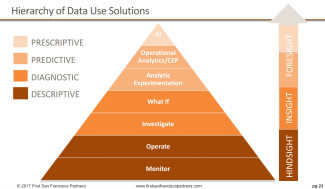The Data Insights & Analytics webinar series, our partnership with DATAVERSITY, continued this month with a session on Analytics, Business Intelligence and Data Science. Our Founder and CEO Kelle O’Neal led the webinar, which was sponsored by Looker Data Sciences.
Key topics for the webinar included definitions of Business Intelligence (BI), Analytics and Data Science, as well as differences in architectures and when to use these data analysis types. Kelle also covered the evolution between Analytics, BI and Data Science.
Analytics, BI and Data Science Webinar
Here are highlights from the one-hour webinar, which included Q&A throughout the session:
- Kelle said to consider the core capabilities of BI, Analytics and Data Science and understand how they’re part of a “tool kit” that can provide your organization with data analysis capabilities that are useful for specific business purposes, use cases and types of data.
- She said that while there isn’t a solid distinction between these data analysis types, there are some general definitions, which Gartner’s IT Glossary does a nice job of defining here:
- Business Intelligence – an umbrella term that includes the applications, infrastructure and tools, and best practices that enable access to and analysis of information to improve and optimize decisions and performance.
- Analytics – a catch-all term for a variety of different BI and application-related initiatives. For some, it is the process of analyzing information from a particular domain, such as website analytics. For others, it is applying the breadth of BI capabilities to a specific content area (for example, sales, service, supply chain and so on).
- Data Science – (covered in the Advanced Analytics definition) the autonomous or semi-autonomous examination of data or content using sophisticated techniques and tools, typically beyond those of traditional BI, to discover deeper insights, make predictions or generate recommendations. Advanced analytic techniques include those such as data/text mining, machine learning, pattern matching, forecasting, visualization, semantic analysis, sentiment analysis, network and cluster analysis, multivariate statistics, graph analysis, simulation, complex event processing and neural networks.
- Kelle reviewed architectural drivers and differences for BI, Analytics and Data Science. She covered the applications for BI (i.e., those using a more traditional and backward-looking approach) and Analytics/Data Science (i.e., contemporary and forward-looking) — and she stated that business goals and information requirements will drive the best approach. (Pages 11 and 12 of the webinar material offers a graphical representation of these drivers and differences.)
- She outlined three principles that can help you determine which part of the data analysis spectrum to use:
- BI and Analytics architectures should reflect the business’ need.
- Supporting organizations for BI and Analytics need to be true self-service.
- Architectural solution must support both traditional and contemporary environments.
Kelle covered the progression of leading data analysis types and how certain tools and approaches have gone in and out of favor over the years. She also shared a hierarchy of data use solutions (prescriptive, predictive, diagnostic and descriptive), saying “hierarchy” is not intended to denote ranking or priority since each type has its own use. (For a more detailed look at key analysis types, read our March 2017 webinar recap.)

Kelle O’Neal’s “Hierarchy of Data Use Solutions” graphic from the Analytics, Business Intelligence and Data Science webinar.
Up Next: Data Lake Webinar
To catch the full replay of the Analytics, Business Intelligence, and Data Science webinar, download the presentation material or view the session’s recording.
We hope you join next month’s Data Insights & Analytics (DIA) webinar, Data Lake Architecture, with Kelle and our Chief Delivery Officer John Ladley. Want to stay in the know about upcoming DIA webinars and other First San Francisco Partners news? Let us know!

